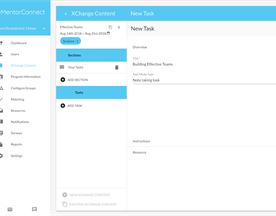What questions to ask a mentor? Ask about career paths, overcoming challenges, skill development, networking strategies, and keys to success. #MentorshipQuestions
Mentorship can be a valuable experience for individuals looking to advance their careers. A mentor can provide guidance, support, and advice to help mentees navigate professional challenges and achieve their goals. However, it’s important to approach mentorship with a plan and a set of questions to ensure that the relationship is productive and beneficial for both parties.

Understanding the mentorship process is key to preparing for a successful mentorship relationship. Mentors can provide guidance on career development, networking, and skill-building, but it’s up to the mentee to take the initiative and ask the right questions. Building a rapport with a mentor is important, but it’s equally important to have a clear understanding of what you hope to gain from the relationship. By preparing a list of questions to ask a mentor, mentees can ensure that they are getting the most out of their mentorship experience.
Key Takeaways
- Approach mentorship with a plan and a set of questions to ensure a productive and beneficial relationship.
- Understanding the mentorship process is key to preparing for a successful mentorship relationship.
- Building a rapport with a mentor is important, but it’s equally important to have a clear understanding of what you hope to gain from the relationship.
Understanding Mentorship
Mentorship is a professional relationship where an experienced individual, known as the mentor, provides guidance and support to a less experienced individual, known as the mentee. The mentor helps the mentee to develop their skills, knowledge, and abilities in a particular field or area.
Defining a Good Mentor
A good mentor is someone who has the necessary expertise, experience, and knowledge in the field or area the mentee wants to develop. They are patient, supportive, and willing to share their knowledge and experience with the mentee. A good mentor is also a good listener, able to provide constructive feedback, and help the mentee set goals and develop a plan to achieve them.
Benefits of Having a Mentor
Having a mentor can provide numerous benefits to the mentee, including:
- Access to valuable knowledge and expertise
- Guidance and support in developing skills and abilities
- Networking opportunities
- Increased confidence and motivation
- Career advancement opportunities
Types of Mentorship
There are several types of mentorship, including:
- Formal mentorship: This type of mentorship is structured and usually involves a mentor and mentee from the same organization or industry.
- Informal mentorship: This type of mentorship is less structured and may involve a mentor and mentee from different organizations or industries.
- Peer mentorship: This type of mentorship involves a mentor and mentee who are at a similar level of experience and knowledge.
For more information on mentorship, visit The Balance Careers.
Preparing for Mentorship
Before starting a mentorship, it’s important to prepare oneself to get the most out of the experience. This section covers the key aspects of preparing for mentorship, including finding the right mentor, setting clear expectations, and establishing goals.
Finding the Right Mentor
Finding the right mentor is crucial for a successful mentorship. It’s important to find someone who has experience in the field or area in which the mentee wants to grow. The mentor should also be someone who is approachable, willing to share their knowledge, and has a positive attitude towards mentorship.
One way to find a mentor is to ask for recommendations from colleagues or friends who have had successful mentorship experiences. Another way is to attend networking events or conferences and approach potential mentors directly. LinkedIn is also a great resource for finding potential mentors in a specific field.
Setting Clear Expectations
Setting clear expectations is essential for a successful mentorship. The mentee should have a clear understanding of what they hope to gain from the mentorship and communicate this to their mentor. This includes the frequency and duration of meetings, the areas in which the mentee wants to improve, and any specific goals they hope to achieve.
The mentor should also communicate their expectations to the mentee. This includes the level of commitment they expect from the mentee, the areas in which they are willing to provide guidance, and any limitations they may have.
Establishing Goals
Establishing goals is an important part of preparing for mentorship. The mentee should have a clear understanding of what they hope to achieve through the mentorship. This includes both short-term and long-term goals.
The mentee should also communicate their goals to their mentor. The mentor can help the mentee set realistic goals and provide guidance on how to achieve them. Regular check-ins can help the mentee stay on track and adjust their goals as needed.
To learn more about preparing for mentorship, check out this article by Forbes.
Building the Relationship
Building a strong relationship with a mentor is crucial for a successful mentoring experience. This section will provide tips on how to create a positive and effective relationship with your mentor.
Creating Rapport
Creating rapport is the foundation of any relationship. It is important to establish a good rapport with your mentor to build trust and create a comfortable environment for communication. To create a good rapport, it is important to find common interests and values and to show genuine interest in your mentor’s experiences and perspectives.
Effective Communication
Effective communication is essential for a successful mentoring relationship. It is important to communicate clearly and openly with your mentor to ensure that both parties understand each other’s expectations and goals. Active listening is also a crucial component of effective communication. This means paying attention to what your mentor is saying and asking clarifying questions when necessary.
Trust and Confidentiality
Trust and confidentiality are critical components of a successful mentoring relationship. It is important to establish trust with your mentor by being honest and transparent about your goals, challenges, and concerns. Confidentiality is also crucial to ensure that both parties feel comfortable sharing sensitive information. It is important to establish clear boundaries and expectations around confidentiality at the beginning of the mentoring relationship.
To learn more about building a successful mentoring relationship, check out this resource.
Navigating Your Career

Asking a mentor about career development can help you gain clarity and direction for your professional journey. Here are some questions to consider:
Career Path Exploration
- What are some potential career paths within my industry?
- How can I gain experience in areas that interest me?
- What skills should I focus on developing to advance in my career?
Professional Growth Strategies
- What are some effective ways to network within my industry?
- How can I improve my leadership skills?
- What are some resources for continuing education and professional development?
Handling Career Transitions
- How can I successfully transition to a new role or industry?
- What are some strategies for managing career setbacks or challenges?
- How can I leverage my skills and experience to make a career change?
It’s important to remember that career development is a continuous process. By seeking guidance from a mentor and exploring different opportunities, you can create a fulfilling and successful career path.
For more information on career development, check out this resource.
Developing Skills and Expertise

Mentors can provide valuable guidance and support in helping individuals develop their skills and expertise. Here are some key areas where a mentor can be particularly helpful:
Leadership and Management
Effective leadership and management skills are essential for success in many industries. A mentor can provide guidance on how to develop these skills, including how to communicate effectively with team members, how to delegate tasks, and how to make difficult decisions. They can also offer advice on how to build strong relationships with colleagues and how to navigate office politics.
One resource that can be helpful in developing leadership skills is the Harvard Business Review. They offer a range of articles and resources on leadership and management, including tips on how to become a better leader and how to manage difficult employees.
Technical and Soft Skills
Mentors can also provide guidance on developing technical and soft skills. Technical skills are specific abilities related to a particular field or industry, such as programming or data analysis. Soft skills, on the other hand, are more general skills that are important in many different roles, such as communication, problem-solving, and teamwork.
One resource that can be helpful in developing both technical and soft skills is LinkedIn Learning. They offer a range of courses on topics such as programming languages, project management, and communication skills.
Public Speaking and Presentation
Public speaking and presentation skills are important in many different roles, from sales to management. A mentor can provide guidance on how to develop these skills, including how to prepare for presentations, how to engage an audience, and how to handle nervousness or anxiety.
One resource that can be helpful in developing public speaking and presentation skills is Toastmasters International. They offer a range of resources and support for individuals looking to improve their public speaking skills, including local clubs where individuals can practice their skills in a supportive environment.
Overall, a mentor can provide valuable guidance and support in helping individuals develop their skills and expertise. By focusing on areas such as leadership and management, technical and soft skills, and public speaking and presentation, individuals can gain the skills they need to succeed in their chosen field.
Maximizing Mentorship Sessions

Mentorship sessions can be incredibly valuable for personal and professional growth. However, to make the most of these sessions, it is important to have a plan and approach them strategically. Here are some tips for maximizing mentorship sessions.
Asking Insightful Questions
One of the most important aspects of mentorship sessions is asking the right questions. It is important to come prepared with a list of questions that are relevant to your goals and areas of growth. These questions should be specific, open-ended, and thought-provoking. This will allow your mentor to provide you with valuable insights and advice.
To help you get started, Forbes has compiled a list of 15 questions to ask a mentor. These questions cover a range of topics, from career development to personal growth.
Receiving and Implementing Feedback
Feedback is an essential part of the mentorship process. It allows you to identify areas of improvement and make necessary changes. However, it is important to receive feedback with an open mind and a willingness to learn.
When receiving feedback, it is important to listen carefully and ask clarifying questions. This will help you understand the feedback and how you can apply it to your personal and professional growth. Once you have received feedback, it is important to take action and implement the necessary changes.
Reviewing Progress and Setting New Goals
Regularly reviewing progress and setting new goals is essential for personal and professional growth. During mentorship sessions, it is important to review progress and discuss any challenges or successes. This will help you identify areas of improvement and celebrate your achievements.
Setting new goals is also important for continued growth. These goals should be specific, measurable, achievable, relevant, and time-bound. Your mentor can help you set these goals and provide guidance on how to achieve them.
To learn more about goal setting, MindTools has compiled a comprehensive guide on setting SMART goals.
By following these tips, you can maximize the value of your mentorship sessions and achieve your personal and professional goals.
Overcoming Professional Challenges

Mentors can provide valuable insight and guidance when it comes to overcoming professional challenges. Whether it’s addressing weaknesses, dealing with change, or resolving conflicts, a good mentor can help their mentee navigate these obstacles and come out stronger on the other side.
Addressing Weaknesses and Building on Strengths
One of the most important things a mentor can do is help their mentee identify their strengths and weaknesses. By doing so, they can work together to build on the mentee’s strengths and address their weaknesses. This can involve setting goals, creating action plans, and seeking out resources to help the mentee improve.
A helpful resource for addressing weaknesses and building on strengths is the book “StrengthsFinder 2.0” by Tom Rath. This book provides a framework for identifying and developing one’s strengths, which can be useful for both the mentor and mentee.
Dealing with Change and Uncertainty
In today’s fast-paced business world, change is inevitable. Whether it’s a new boss, a new project, or a new company culture, it can be difficult to navigate these changes without the proper guidance. A mentor can help their mentee develop strategies for dealing with change and uncertainty, such as staying adaptable and flexible, seeking out opportunities for growth, and maintaining a positive attitude.
An external resource that can be helpful for dealing with change is the Harvard Business Review article “How to Help Your Team Embrace Change” by Rebecca Knight. This article provides tips for leaders on how to help their team navigate change and uncertainty, which can also be useful for mentors and mentees.
Resolving Conflicts and Toxic Work Environments
Unfortunately, conflicts and toxic work environments are all too common in today’s workplace. A mentor can help their mentee develop strategies for resolving conflicts and dealing with toxic coworkers or bosses. This can involve practicing effective communication, setting boundaries, and seeking out HR or other resources when necessary.
A helpful resource for dealing with toxic work environments is the book “The No Asshole Rule” by Robert Sutton. This book provides a framework for dealing with difficult coworkers and bosses, and can be useful for both the mentor and mentee.
Overall, a good mentor can provide valuable guidance and support when it comes to overcoming professional challenges. By working together, the mentor and mentee can develop strategies for addressing weaknesses, dealing with change, and resolving conflicts, which can ultimately lead to greater success and satisfaction in the workplace.
Expanding Professional Networks

Expanding one’s professional network is a crucial aspect of career development. Having a mentor can be incredibly valuable in this regard, as they can provide guidance on how to effectively network and introduce their mentees to their own network. In this section, we will explore how a mentor can help expand a mentee’s professional network, as well as some strategies for effective networking.
Leveraging Mentor’s Network
One of the most significant benefits of having a mentor is the opportunity to tap into their network. A mentor’s network is often extensive, and they may have connections in industries or organizations that a mentee would not have access to otherwise. Mentees should communicate their career goals to their mentor and ask for introductions to people in their mentor’s network who may be able to offer guidance or opportunities.
Networking Strategies
Networking can be intimidating, but it is a necessary skill in today’s job market. Mentees should work with their mentor to develop a networking strategy that works for them. This could include attending industry events, joining professional organizations, or even utilizing social media platforms like LinkedIn. It’s important for mentees to remember that networking is not just about meeting new people, but also about building and maintaining relationships.
Collaboration and Team-Building
Networking is not just about finding job opportunities; it’s also about building relationships that can lead to collaboration and team-building. Mentees should work with their mentor to identify potential collaborators or team members within their network. This could include individuals with complementary skills or those working in similar industries. By working together, mentees can expand their skillsets and increase their value in the job market.
Overall, expanding one’s professional network is essential for career development. Mentees should work with their mentor to identify networking opportunities and develop a strategy that works for them. By leveraging their mentor’s network, utilizing effective networking strategies, and building collaborative relationships, mentees can expand their professional network and increase their career opportunities.
For more information on effective networking strategies, check out this article from Forbes.
Planning for Long-Term Success

Mentors can be an invaluable resource for individuals who are seeking guidance on how to achieve long-term success in their personal and professional lives. By asking the right questions, mentees can gain valuable insights into how they can set themselves up for success in the long run.
Setting Career and Personal Goals
One of the most important aspects of planning for long-term success is setting clear and achievable goals. Mentors can help mentees identify their strengths and weaknesses, and work with them to develop a plan for achieving their goals. This may involve setting short-term milestones to help track progress and stay on track.
To help mentees get started, MindTools offers a comprehensive guide to setting SMART goals. This resource provides a step-by-step approach to setting goals that are Specific, Measurable, Achievable, Relevant, and Time-bound.
Work-Life Balance
Achieving long-term success is not just about advancing in one’s career. It is also important to maintain a healthy work-life balance. Mentors can help mentees identify strategies for managing their time and energy, and finding ways to prioritize their personal and professional obligations.
One helpful resource for achieving work-life balance is Harvard Business Review. This article provides practical tips for finding balance, such as setting boundaries, delegating tasks, and prioritizing self-care.
Continual Learning and Self-Improvement
Finally, achieving long-term success requires a commitment to continual learning and self-improvement. Mentors can help mentees identify areas for growth and development, and provide guidance on how to acquire new skills and knowledge.
One resource for lifelong learning is Coursera, which offers online courses from top universities and organizations around the world. By taking advantage of these resources, mentees can gain new insights and skills that can help them achieve their long-term goals.
Leveraging Mentorship for Leadership

Mentorship is an excellent way to learn and grow as a leader. By working with a mentor, individuals can gain valuable insights into leadership qualities and skills, as well as how to mentor others and create a personal brand. Here are some ways to leverage mentorship for leadership.
Leadership Qualities and Skills
One of the most significant benefits of mentorship is the opportunity to learn from someone who has already achieved success in a particular field. A mentor can help individuals develop leadership qualities such as communication, problem-solving, and decision-making skills. They can also offer guidance on how to navigate complex situations and build relationships with stakeholders.
To improve leadership skills, individuals can ask their mentor to share their experiences and insights. They can also seek feedback on their own leadership style and work with their mentor to set goals for improvement.
Mentoring Others
As individuals progress in their careers, they may have the opportunity to mentor others. Mentoring is a valuable way to give back to the community and help others achieve their goals. It is also an opportunity to develop leadership skills such as coaching, communication, and empathy.
To become an effective mentor, individuals can work with their mentor to develop a mentoring plan. This plan should include goals for both the mentor and mentee and a timeline for achieving these goals. It should also include strategies for communication and feedback.
Creating a Personal Brand
A personal brand is the reputation that an individual creates for themselves in their industry. It is an essential aspect of leadership, as it can help individuals stand out and build credibility with stakeholders. A mentor can help individuals develop a personal brand by providing guidance on how to communicate their strengths and values effectively.
To create a personal brand, individuals can work with their mentor to identify their unique strengths and values. They can also seek feedback on their communication style and develop a strategy for building their brand online and offline.
Overall, mentorship is an excellent way to develop leadership qualities and skills, mentor others, and create a personal brand. By leveraging mentorship, individuals can accelerate their career growth and achieve their goals. For more information on mentorship and leadership, visit Harvard Business Review.
Frequently Asked Questions

What goals should I set for my personal and professional development?
Setting goals is an essential step towards achieving personal and professional growth. A good mentor can help you identify your strengths, weaknesses, and areas of improvement. They can guide you in setting SMART (Specific, Measurable, Achievable, Relevant, and Time-bound) goals that align with your interests and aspirations. To learn more about setting effective goals, check out this resource.
How can I effectively balance work and life responsibilities?
Balancing work and life responsibilities can be a daunting task, but it is crucial for maintaining a healthy and fulfilling life. A mentor can provide you with practical tips and strategies to help you manage your time effectively. They can also help you prioritize your goals and find ways to delegate tasks to others. To learn more about work-life balance, check out this resource.
What are the most important skills I should develop for my career field?
Each career field has its unique set of skills that are essential for success. A mentor can help you identify the skills that are most relevant to your career path and guide you in developing them. They can also provide you with insights into the latest trends and developments in your industry. To learn more about the skills required for your career field, check out this resource.
Can you share an experience where you overcame a significant challenge?
Sharing experiences of overcoming challenges can help you gain valuable insights into how to deal with difficult situations. A mentor can share their personal experiences and provide you with guidance on how to overcome challenges that you may face in your personal or professional life. To learn more about overcoming challenges, check out this resource.
What strategies do you use for making important decisions?
Making important decisions can be a stressful and overwhelming task. A mentor can guide you in developing effective decision-making strategies that align with your values and goals. They can also provide you with insights into how to weigh the pros and cons of different options. To learn more about decision-making strategies, check out this resource.
How do you suggest I expand my professional network?
Expanding your professional network is essential for career growth and development. A mentor can provide you with practical tips and strategies to help you build meaningful relationships with professionals in your industry. They can also introduce you to people in their network who can provide you with guidance and support. To learn more about expanding your professional network, check out this resource.












